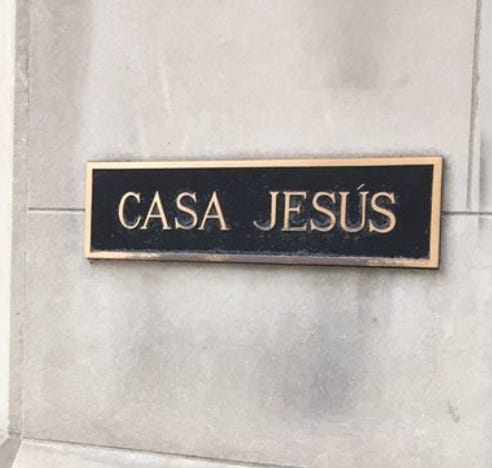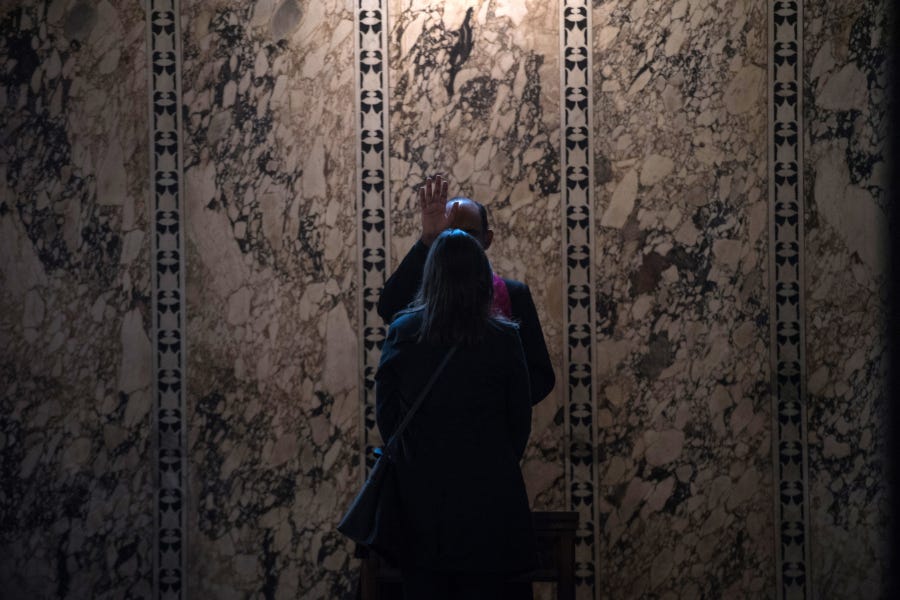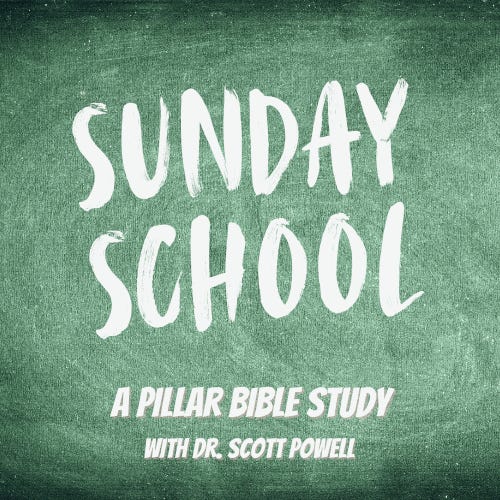Three dioceses in southern Italy became the latest this month to suspend the practice of appointing baptismal sponsors — godparents — along with confirmation sponsors for both children and adults.
The suspension, set for an ad experimtum period of three years, in the dioceses of Teano-Calvi, Alife-Caiazzo and Sessa Aurunca, was announced in early March, when Bishop Giacomo Cirulli, who leads all three dioceses, said that the role of baptismal sponsors had “lost its original value” in the Church’s life.
Baptismal sponsorship had been “reduced to a sort of … social custom,” Cirulli said.
The bishop’s decision will take effect April 9, Easter Sunday.
How will this work? Is it really allowed? And what’s a “godparent” for, anyway?
The Pillar explains.
So what happened?
Bishop Giacomo Cirulli, who leads three dioceses in southern Italy, announced to Catholics March 4 that “in today's socio-ecclesial context, the office of godfathers and godmothers, for the most part, has lost its original value," and would therefore be suspended in the dioceses under his care.
The bishop said that catechists and other pastoral care workers will offer spiritual support to newly baptized and confirmed Catholics, and that he would evaluate the situation in 2026.
While the news seems unusual, it’s became a common move in Italy.
In July 2020, Bishop Michele Fusco, in the Diocese of Sulmona-Valva, announced a three-year suspension of baptismal sponsors in his local church. The bishop said that the practice of choosing godparents had become a social custom “in which the dimension of faith is hardly visible.”
In 2021, the Sicilian diocese of Catania made the same decision, again, announcing a three-year ban on the practice.
And since that time, according to the Italian newspaper Il Messaggero, a number of dioceses in regions across Italy have followed suit; the matter has become something of a custom, the newspaper reports. In fact, baptisms performed by Pope Francis in the Sistine Chapel, according to Il Messaggero, have not included godparents.
What does canon law say?
The Church’s Code of Canon Law explains that whenever possible, “a person to be baptized is to be given a sponsor who assists an adult in Christian initiation or together with the parents presents an infant for baptism.”
A sponsor “helps the baptized person to lead a Christian life in keeping with baptism and to fulfill faithfully the obligations inherent in it,” canon 872 explains.
The Church’s law explains that to be a baptismal sponsor — a godparent — a person must be a Catholic, be confirmed, and must ordinarily be at least 16 years old. If there are two baptismal sponsors, canon law says, one must be a man and the other a woman.
A sponsor must also “lead a life of faith in keeping with the function to be taken on,” canon law explains.
Generally, ministers of baptism are taught that in order to be judged qualified to serve as a baptismal sponsor, a person must at a minimum regularly attend Mass, profess the Catholic faith, and not live in some stable situation opposed to Catholic teaching — which could mean cohabiting without the benefit of marriage, belonging publicly to an anti-Catholic or otherwise offensive group or association, or engaging in some ongoing criminal or morally offensive activity.
In 2015, the Holy See upheld the decision of a Spanish diocese which determined that a person identifying as transgender could not become a godparent, but that question, and others related to sexual orientation or gender identity have continued to be debated, and controversial, among some Catholics in some dioceses.
In reality, practice in the Church varies with regard to the “faith” qualifications required for godparents. The Church’s law gives guidance to the ministers of baptism, but since they must make decisions about suitability themselves, while following any diocesan policy established on the subject, experience varies from place to place, and even from priest to priest, on what might be required regarding the Catholic praxis of a potential sponsor.
Pastors are often asked whether non-Catholics can serve as baptismal sponsors. For the most part, canon law says no. A Protestant Christian can serve as a “Christian witness” to a baptism, if there is also a Catholic sponsor, but an Orthodox Christian can serve as a baptismal sponsor alongside a Catholic sponsor.
A lapsed Catholic, still being a Catholic in the eyes of the Church, can not serve as a “Christian witness” at a baptism, and would be seemingly ineligible to function as a sponsor either, given the paucity of their Christian practice.
With regard to confirmation, the Church says that a sponsor should be appointed “insofar as is possible,” and that the sponsor “is to take care that the confirmed person behaves as a true witness of Christ and faithfully fulfills the obligations inherent in this sacrament.”
Canon 893 explains that the Church prefers that a person’s baptismal sponsor also serve as a confirmation sponsor, and explains that the criteria for serving as a confirmation sponsor are identical to the ones laid out for baptism.
Have there always been sponsors?
Most historians say that the practice of choosing baptismal and confirmation sponsors is nearly as ancient as the Church itself. Sponsors of Christian initiation in the early Church were faithful and practicing Catholics, who could attest to a local bishop the sincerity of a catechumen’s wish to be initiated into the life of Christ.
St. Augustine mentioned that by his own ministry, in the fifth-century, baptismal sponsors helped to raise new converts out from the font after they had been baptized, symbolically lifting them up as they began their new life in Christ.
There is evidence that the early sponsors of baptized infants were their parents, a practice which is no longer permitted in the Church. In fact, by the end of the first millennium, the role of a spiritual parent - a “godparent” had become distinct from that of natural parents. Godparents came to be seen as both helpers to a baptized infant’s parents, and those who would step in to see that a baptized child was raised in the faith if the parents died.
Why are sponsors now being banned in Italy?
In “The Godfather,” mafia consigliere Tom Hagan famously told a movie producer that “to the Italian people,” becoming a godparent is “a very religious, sacred, close relationship.”
Warning, the clip below contains language, images, and subject matter some readers may regard as inappropriate. It is the horse head scene from “The Godfather,” for heaven’s sake.
But Italian bishops say that’s not always the case.
A number of bishops who have suspended the role of baptismal and confirmation sponsors have suggested that too few of the people selected to be godparents actually practice the faith, and that the selection of godparents seems often to be of reinforcing social and family ties, rather than focusing on the formational call of the baptismal and confirmation sponsor.
In 2020, the NY Times reported that Italian prosecutors have also monitored baptisms in families connected to organized crime, to determine whether mafia leaders actually use the role to spread influence. The notion of the “baptismal bond” has arisen in organized crime prosecutions, the Times reported.
The Times also reported that parish priests in Sicily have sometimes been threatened by would-be godparents, and that the position is sometimes used for a kind of social blackmail, in which godparents are presumed to be available to lend money. And Salvatore Cuffaro, formerly the president of Sicily, told the Times that he is frequently asked to be a godparent by families looking for political connections.
What will happen next?
It’s not clear whether more bishops will continue to suspend the practice of appointing baptismal and confirmation sponsors, or whether the Italian bishops’ conference will take up the issue.
A number of bishops reportedly remain committed to the appointment of sponsors, and the Church’s law remains in effect.
In June, the Diocese Sulmona-Valva will reach the end of its three-year experimental period. At that time, Bishop Fusco could end the experiment, extend it for more years, or move to make it a permanent thing. Given the increasing number of dioceses following Bishop Fuscko’s lead on the issue, the bishop’s decision at the end of the experimental period will likely be a sign of things to come.
Of course, while it seems diocesan bishops have been free to set policies to this effect on their own authority, it’s unclear whether the Vatican’s Dicastery for Divine Worship has weighed in on the issue.




